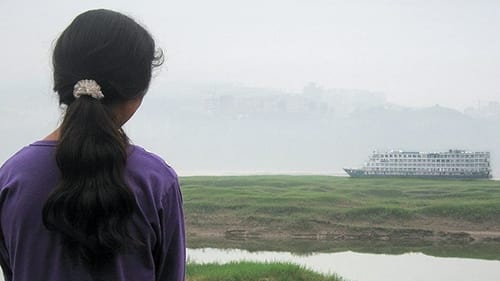Hannele Halm
Nacimiento : 1949-01-01, Turku, Finland

Editor
Deeply rooted in artistic families, young Luben Boykov and Elena Popova escape the repressions of communist Bulgaria and find refuge on the island of Newfoundland in 1990. With their 2-year-old daughter and sixty dollars they begin to build a new life. At the height of what many would define as success, they leap again, understanding that the greatest risk for art, and for love, is taking it for granted.

Editor
In the stark Labrador interior, a growing number of Filipino workers have recently landed in the small regional hub of Happy Valley-Goose Bay, travelling halfway around the world for jobs they hope will offer their families new opportunities and a better life. Becoming Labrador follows a handful of those women and men as they make a place for themselves in Labrador's profoundly foreign climate and culture, and deal with the unexpected costs of living far from parents, partners and children. Combining documentary footage with interpretive animation, and bringing together the vision of three of Canada's best young directors, Becoming Labrador is a remarkable feat of collaborative authorship. It offers an intimate account of the radical mobility and displacement of the modern world, and of how tenaciously people hold to their roots in the midst of fundamental change.

Editor
In the suburbs of Montreal, Mutang is a family man. But in Malaysia, he was a voice of resistance for the indigenous peoples of Sarawak. The documentary A TIME TO SWIM follows Mutang as he returns home for the first time since his exile in 1992. The remote forest village, however, is not like he remembers it. Contrary to the will of the elders, cousins who once stood by him at the blockades are now welcoming the timber companies. Despite the threat of a lingering arrest warrant, Mutang can’t resist taking up his old cause. A TIME TO SWIM explores the effects of environmental destruction on the fabric of a community through the personal story of Mutang’s search for belonging in a place where the very ideas of home and heritage are slipping away.

Editorial Services
Juanicas is an intimate portrait of a Mexican immigrant family in Quebec affected by mental illness. Using material shot over almost 10 years, the filmmaker documents her complex relationship with her mother and brother, both suffering from bipolar disorder.

Editor
For ancient Mayans, cocoa was as good as gold. For subsistence farmer Eladio Pop, his cocoa crops are the only riches he has to support his wife and 15 children. As he wields his machete with ease, slicing a path to his cocoa trees, the small jungle plot he cultivates in southern Belize remains pristine and wild. His dreams for his children to inherit the land and the traditions of their Mayan ancestors present a familiar challenge. The kids feel their father's philosophies don't fit into a global economy, so they're charting their own course. Rohan Fernando's direction tenderly displays a generational shift, causalities of progress in modern times and a man valiantly protecting an endangered culture. Breathtaking vistas of lush rainforests contrast with the urban dystopia that pulled Pops children away from him. Will one child return to carry on a waning way of life

Editor
A luxury cruise boat motors up the Yangtze - navigating the mythic waterway known in China simply as "The River." The Yangtze is about to be transformed by the biggest hydroelectric dam in history. At the river's edge - a young woman says goodbye to her family as the floodwaters rise towards their small homestead. The Three Gorges Dam - contested symbol of the Chinese economic miracle - provides the epic backdrop for Up the Yangtze, a dramatic feature documentary on life inside modern China.

Editor
Filmed at the Wing Fong Farm in Ontario, this documentary follows the tilling, planting and harvesting of Asian vegetables destined for Chinese markets and restaurants. On 80 acres of land, Lau King-Fai, her son and a half-dozen migrant Mexican workers care for the plants. For Yeung Kwan, her son, the farm represents personal and financial independence. For his mother, it is an oasis of peace. For the Mexican workers, it provides jobs that help support their children back home.

Editor
When Hydro-Québec announced its intention to proceed with the enormous James Bay II hydroelectric project, the 15,000 Cree who live in the region decided to stand up to the giant utility. With unprecedented access to key figures like Cree leader Matthew Coon Come and American environmental activist Robert Kennedy Jr., Power is the compelling, behind-the-scenes story of the Cree's five-year battle to save the Great Whale River and their traditional way of life.

Additional Editing
Women have always sought ways to terminate unwanted pregnancies, despite powerful patriarchal structures and systems working against them. This film provides a historical overview of how church, state and the medical establishment have determined policies concerning abortion. From this cross-cultural survey--filmed in Ireland, Japan, Thailand, Peru, Colombia, and Canada--emerges one reality: only a small percentage of the world's women has access to safe, legal operations.

Editor
Haji Omar and his three sons belong to the Lakankhel, a Pashtoon tribal group in northeastern Afghanistan. The film focuses on his family: Haji Omar, the patriarch; Anwar, the eldest, his father's favorite, a pastoralist and expert horseman; Jannat Gul, cultivator and ambitious rebel; and Ismail, the youngest, attending school with a view to a job as a government official.

Editor
In this feature documentary, 6 student activists visit 36 Canadian towns to take on one giant corporation. Filmed over 2 summers, these young crusaders (plus a gonzo journalist) try to raise public awareness about Wal-Mart's business practices and their effect on cities and towns across Canada. With youthful passion and often hilarious cultural jams, this film takes us to the frontlines of the ongoing debate over the company's increasing dominance in the Canadian retail market.










